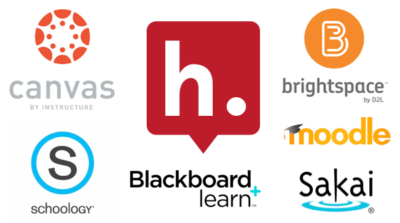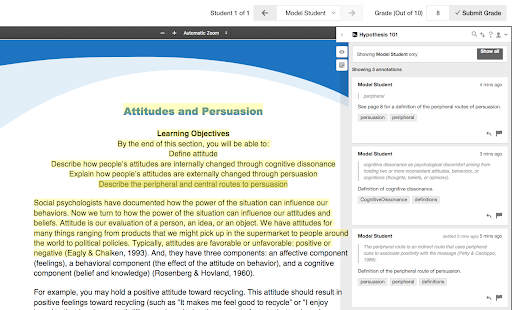Hypothesis Releases Gradebook Integration for Blackboard, Moodle, D2L & More

Last December, we released the Hypothesis LMS app, a tool that enables you to integrate collaborative web annotation for course readings in any LMS with single sign-on and automatic private annotation groups for each class. In August, we announced the Hypothesis app’s first LMS gradebook integration for Instructure Canvas. We are now pleased to announce gradebook integration for any LMS that supports IMS Learning Tools Interoperability (LTI), including not only Canvas, but also Blackboard, D2L Brightspace, Moodle, Sakai, and Schoology.
We developed this feature at the request of our educational users who wanted to make annotation activity part of their formal assessment processes. As they’ve explained to us, teachers want to make annotations gradable both to incentivize students and to give them credit for the work they do. In addition, making annotation part of formal assessment enables educators and learners to focus on the skills and practices necessary to develop various literacies.
Gradebook integration will greatly enhance the workflow of assessing student annotations for those that choose to do so, as some users expressed themselves before we got this announcement out.

As in our Canvas integration, our model for gradebook integration in other LMS singles out each student’s contributions to a conversation on a document, both annotations and replies, and enables instructors to enter a grade for an annotated reading assignment.

IMS Global LTI Certification
We have also completed the steps to certify the Hypothesis LMS app for IMS Global’s Learning Tools Interoperability (LTI) 1.1 and LTI Outcomes Service 1.x standards. Like our work to establish and meet the W3C web annotation standard, we believe adhering to common standards like LTI will enable Hypothesis annotation to work as designed in as many contexts as possible with a minimum of technical configuration. We strive to meet standards to support the interoperability that is core to our mission to enable everyone to annotate everywhere.
Our next steps with the LMS app include meeting additional IMS LTI standards, like the newer LTI Advantage that is starting to be supported more widely by learning management systems and other educational tools.
Add Hypothesis to your LMS
If you don’t already have the Hypothesis LMS app installed at your campus, get credentials or send your local LMS admin to add the external tool to your LMS and course. If you already have the Hypothesis LMS app installed, browse our expanding set of tutorials for different LMSs to learn more about how the new grading functionality can improve your workflow for assessing student annotations.
Start using Hypothesis in your LMS and learn more about pricing for your school.
Reach out if you need help getting started. Our supported pilots are helping schools like Brigham Young University, California State University-Channel Islands, College of Western Idaho, Colorado State University-Pueblo, Contra Costa College, Dartmouth College, Davidson College, Dearborn Public Schools, Diablo Valley College, Finger Lakes Community College, George Mason University, Indiana University, Metropolitan State University Denver, Muhlenberg College, Plymouth State University, Rocky Mountain University of Health Professionals, Rutgers University, St. Edwards University, Trinity College, University of Michigan, University of Michigan-Dearborn, University of Michigan-Flint, University of New Haven, University of Portland, and University of Virginia implement collaborative annotation in live classes with support and training to help make sure students can start annotating easily, following best practices from other educators.
This is only the first version of our gradebook integration, so please give us feedback about what works, what doesn’t, and what you’d like to see next.
Start a supported pilot with Hypothesis at your school.